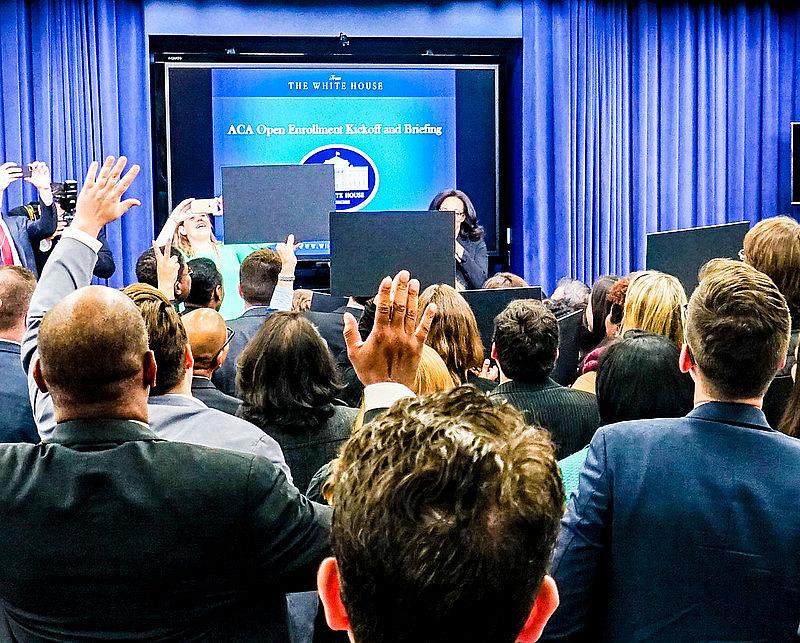Bob Herman is one of the few reporters still pulling back the curtain on the business of health care

Photo by Ted Eytan via Flickr/Creative Commons
When you add up all of Bob Herman’s writings for STAT News or even a small fraction of them, you know the U.S health care system is in serious trouble — at least from the perspective of patients. Herman, who has covered the business of health for Modern Healthcare, Axios and now STAT, approaches the topic these days with an eye to the users of the system. The business of health care used to be an essential beat, but over the years many journalists have gravitated to other fields like consumer health, or more recently, the social determinates of health. That makes Herman’s work even more vitally important. His November expose, written with colleague Casey Ross, lays bare the tactics that the country’s largest insurer, UnitedHealth, uses to achieve that position. In recent years the nation’s insurance companies have largely escaped this kind of press scrutiny, which makes STAT’s contribution all the more important and a rare stand-out in public interest journalism these days.
Herman and Ross revealed in great detail one of United’s business strategies that account for the company’s stunning financial success, driven by what Herman described in our interview as “such brazen behavior.” Using a computer algorithm, it pressured the company’s medical staff to cut off payments for seriously ill patients, “denying rehabilitation care for older and disabled Americans as profits soared.” The reporters also noted that the company’s “stringent performance goal was part of a broader effort to reduce expensive nursing home care for frail patients with privatized Medicare plans.” In other words, the scheme was designed to target those Medicare beneficiaries who had chosen Medicare Advantage plans. What’s more, the reporters pointed out that the federal government, which has oversight over MA plans, “has largely allowed these practices to proliferate.” That is hardly surprising since Medicare regulators at the Centers for Medicare and Medicaid Services have over the years consistently crafted rules that favor Medicare Advantage. In this case, the agency told Herman it was “looking into these allegations and may take necessary enforcement or compliance actions.”

Bob Herman.
At the end of December Herman and Ross struck again with more revelations of United’s questionable treatment of seriously ill Medicare Advantage patients. Their reporting revealed that the insurer “used secret rules to restrict access to rehabilitation care” that certain groups of seriously ill patients had requested. STAT revealed that many of those patients lived in nursing homes or suffered from cognitive impairment. They also reported that some of the restrictions imposed on patient care “appear to have had little or no basis in clinical evidence” and that such denials of care could well get them in hot water with Medicare regulators and federal rules, which require Advantage plans to cover the same services as traditional Medicare. In this new story, STAT reported that the giant insurer “abruptly told frontline clinical reviewers to stop” following United’s restrictions and “apply more of their own discretion.” The reporters noted that the new directive “coincided with increased scrutiny of Medicare Advantage insurers from federal lawmakers and the Centers for Medicare and Medicaid Services, which will begin auditing their denials of medical care in the new year. Obviously, such denials are detrimental to patients who may be “extremely sick” and are “forced to either forgo treatment or pay thousands of dollars out of pocket to continue their recoveries,” they wrote. The story also told the predicament of a sick, 80-year-old North Carolina woman who encountered denials of care from her Humana Medicare Advantage plan. Her family and doctors had hoped to transfer her to a long-term acute care hospital to recover, but Humana only agreed to pay for cheaper care in a nursing home. “Humana was using the same practices as United,” Herman told me. “They are piggybacking using the same care management company.”
While those recent stories exposing insurance companies’ unsavory business practices are examples of first-rate journalism, Herman’s dogged pursuit of the business practices of the nation’s hospitals also deserve a shoutout. Hospitals, often sacred cows in their communities, were once the subject of routine journalistic exposes, some leading to beneficial changes for patients, so it is rather important that STAT has begun to close the coverage hole that has developed in recent years. “The public has no idea what’s going on with their local hospital, a casualty of the slow death of local newspapers,” Herman told me. He pointed out that hospitals “give an image that they are good guys,” but “people don’t understand they are a business first and foremost,” adding that “at least the bigger ones have dozens of PR people to control the message and they do that extremely well. They don’t take criticism well either.” Such PR strategies to limit press scrutiny are all the more reason for dogged journalism here, as difficult as it may be to do these days. “They rarely offer interviews unless it is in a very controlled setting with PR people around,” Herman explained. “They don’t really say anything that is off message and stick to buzz words and fluff. When they offer a brief comment, it’s hard to hold them accountable. They are not willing to explain basic things,” he said. “Generally, that’s a distraction and is not helpful for good reporting. That’s when you have to rely on former and current employees who will talk and shoe-leather reporting.” We talked about the current PR practice of sending sanitized statements that say virtually nothing. “So many companies now send statements instead of offering interviews which is cowardly,” Herman told me. “Of course, that’s the point from the company’s point of view.”
Herman’s health business portfolio is large and varied. Last summer he produced a story that told how Americans fed up with the rising cost of health insurance were fighting their own insurance carriers in court. “Companies, unions, and workers are at a breaking point over how much they pay for health coverage,” he wrote. “Some are so exasperated that they’re fighting their own health insurance carriers in court.” He reported that a “string of new lawsuits and judge orders highlights employers’ frustration with health insurers, who they believe are allowing hospitals, doctors and other entities to charge flagrantly high prices with little to no pushback.” That has forced workers and employers to pay some big bills for coverage. Employers who pay a large share of the tab for their workers’ health coverage are getting fed up. While Medicare Advantage and Medicaid in certain states are now attracting some press attention, it’s rare to see much coverage of employer-provided health insurance these days. Herman’s stories provide a template for changing that, and he told me employers who are fed up with exorbitant prices they pay for their employees’ coverage are great resources for journalists. Not to mention the employees footing ever-larger bills: It is not uncommon for families to face deductibles of $5,000 to $10,000 a year, as former health care journalist Marshall Allen told me last year (he now coaches people on fighting exorbitant hospital bills). As Herman has reported, some employers are finally pushing back. When I asked him how this story can be done by other journalists, he suggested that reporters talk to the local business groups on health in many communities, such as the Northeast Business Group on Health or the Purchaser Business Group on Health (formerly the Pacific Business Group on Health).
A recurring focus in many of Herman’s stories is how players in the health care system make oodles of money. In America’s profit-driven health care industry, that is not unusual, but when comparing our system with those of other countries that have universal systems and government financing, it stands out as an outlier, one that often fails to deliver the best or most timely care. Instead, it often results in the systems’ players fighting each other over money and power. One such story that Herman followed was the recent merger of Geisinger, a large health system in central Pennsylvania that recently merged with Kaiser Permanente, the giant system headquartered in California.
Herman’s stories offer his readers a comprehensive picture of the fall of Geisinger, which until recent years had enjoyed a good reputation. It was even singled out by President Obama as a model health system when he was promoting the Affordable Care Act. Herman’s story is important for what it portends for the rest of the health care system: a few big hospital systems and a few giant insurance companies controlling the country’s health care industry and poised to influence the cost and quality of care for most Americans. It is clear from Herman’s reporting that the U.S. health care system is itself sick and badly in need of repair. The challenge is how to get to broader audiences the kind of information and scrutiny Herman and colleagues are giving to Stat’s more specialized audience. “Health care is so far from a free marketplace” Herman observed. That alone is an invitation to follow Herman’s lead.
I thought a lot about the dilemma health journalism finds itself in on the eve of a new year. The stories that Herman and colleagues have written must be replicated across the country if Americans are to know anything about the increasingly complex, PR-managed, for-profit system they must navigate to stay well. “We have the best care in the world,” we were told over and over more than a decade ago when Obamacare was debated and finally passed. That premise was debatable even then. But if the Affordable Care Act turns out to be the endgame in repairing or redoing American health care, patients will be in real trouble as the stories Herman and his colleagues have so ably warned.
As I worked on this story through the weeks of Medicare's open enrollment, hearing deceptive ads from disingenuous pitchmen likely to snag more converts for Medicare Advantage plans, I thought about the dilemma facing our profession, with more and more great journalism like Herman’s behind a paywall. That means it doesn't reach the masses, and particularly would-be Medicare Advantage members. They should know that there’s a chance, should they sign up, that they might not get the needed medical care someday that Herman and colleagues so clearly revealed was being withheld from others like them.
“Journalism ultimately has to be funded by its readers either directly or indirectly," Herman told me. "What we’re doing is not unique. The media just can't chase clicks and ad revenue. It’s not sustainable. News organizations can’t bank their success on ad revenue anymore.” Herman offered another plus. “Having more reader-funded journalism helps the perception you're being a good watchdog and looking out for the public.” All of that is true, but there still needs to be a more accessible way to alert next year's crop of Medicare Advantage recruits that they may want to think twice before rushing to the phone to sign up.

